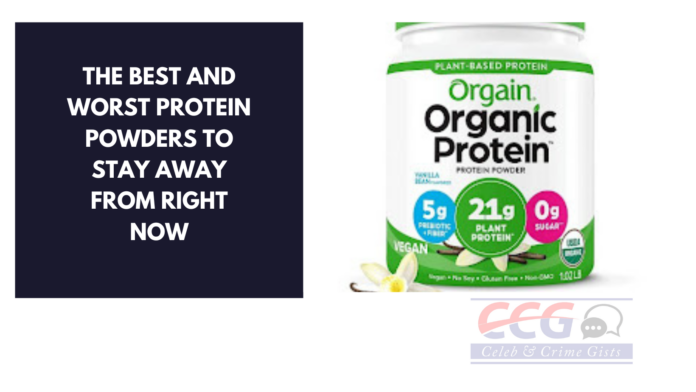The Best and Worst Protein Powders‘ The product recommendations in this post are recommendations by the writer and/or expert(s)
interviewed and do not contain affiliate links. Meaning: If you use these links to buy
something, we will not earn a commission.
It can be a challenge to try and meet your daily protein goals, but getting enough of this nutrient is crucial because it can increase muscle strength, boost your metabolism, help you maintain strong bones, aid in weight loss, and help to reduce your appetite. This is especially challenging for those who are always on the go, which is why protein powder can be a great option for those who need a quick protein boost. Unfortunately, not all of these products are created equal when it comes to nutrition, and some of the worst protein powders on the market can contain hidden health risks in the form of artificial flavors, thickeners, added sugars, and other shady ingredients.
What’s worse, a 2018 Clean Label Project investigation found that some of the most well-known protein brands contained alarming levels of lead, arsenic, mercury, cadmium, and BPAs, and since protein powder is considered a dietary supplement and not food, it’s the manufacturers, rather than the FDA, that oversee the labeling and safety of the products.
READ: The 15 Best Exercises for People Over 40 Who Are Out of Shape
The Best and Worst Protein Powders
“Since the supplement industry is largely unregulated, it’s important to choose well-known brands with third-party testing standards for safety,” registered dietitian Rachel Fine, RD tells us.
Best Protein Powders
- Orgain Organic Protein: This plant-based protein powder is made with a blend of pea, brown rice, and chia proteins, and it’s a good source of fiber and vitamins. It’s also low in sugar and fat, and it has a neutral flavor that makes it easy to mix with other foods or drinks.
- Garden of Life Raw Organic Protein: This protein powder is made with a blend of whey, pea, and hemp proteins, and it’s also a good source of probiotics and enzymes. It’s free of artificial sweeteners, flavors, and colors, and it has a slightly sweet, nutty flavor.
- Myprotein Impact Whey: This whey protein powder is made with 100% whey protein concentrate, and it’s a good source of amino acids. It’s low in fat and carbohydrates, and it has a neutral flavor that makes it easy to mix with other foods or drinks.
- Optimum Nutrition Gold Standard 100% Whey: This whey protein powder is another good option for those looking for a high-quality protein powder. It’s made with whey protein isolate, and it’s a good source of amino acids. It’s also low in fat and carbohydrates, and it has a neutral flavor.
- Dymatize ISO100 Hydrolyzed Whey: This whey protein powder is made with hydrolyzed whey protein isolate, which is a more easily digestible form of whey protein. It’s a good source of amino acids, and it’s low in fat and carbohydrates. It has a slightly sweet, milky flavor.
Worst Protein Powders
- Ghost Protein: This protein powder has been criticized for its high sugar content and artificial ingredients. It also contains stevia, which some people find to have a bitter aftertaste.
- Bodybuilding.com Signature 100% Whey Protein: This protein powder has been criticized for its low protein content and high sugar content. It also contains artificial flavors and colors.
- ON Serious Mass: This protein powder is designed for people who are looking to gain weight, but it’s also very high in calories and sugar. It’s not a good choice for people who are trying to lose weight or eat a healthy diet.
- Muscle Milk: This protein shake is marketed as a healthy meal replacement, but it’s actually high in sugar and calories. It also contains artificial flavors and colors.
- Shakeology: This protein shake is marketed as a “superfood” shake, but it’s actually very expensive and not very nutritious. It contains a lot of added sugar and artificial ingredients.
It’s important to note that these are just a few examples of the best and worst protein powders on the market. There are many other good quality protein powders available, so it’s important to do your research and find one that’s right for you.
Here are some factors to consider when choosing a protein powder:
- Your goals: Are you looking to build muscle, lose weight, or simply improve your overall health?
- Your dietary restrictions: If you have any dietary restrictions, such as being vegan or lactose intolerant, you’ll need to choose a protein powder that’s compatible with your diet.
- Your taste preferences: Some protein powders have a strong, unpleasant taste, so it’s important to choose one that you’ll actually enjoy drinking.
- The price: Protein powders can range in price from very affordable to quite expensive. It’s important to find one that fits your budget.
READ MORE: These Are the 10 Exercises You Need To Lose 20 Pounds – Weight Training Exercises

